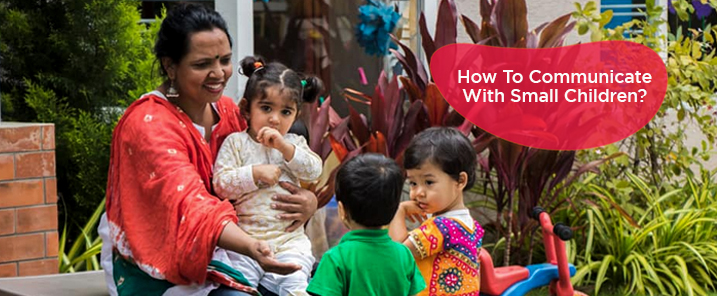Admissions Open For Yello 2024-2025 Limited SeatsContact Us: +918748995555
Admissions Open For Yello 2024-2025 Limited SeatsContact Us: +918748995555

Posted on 21 Sep by Admin |  3 min read
3 min read
Communicating with children effectively is one of the most important skills in parenting. What starts as a body language communication between the mother and child becomes more complex as the child starts speaking. Understanding what your child is saying and putting across what you want to say to your child most effectively is detrimental to building a great parent-child relationship. Being one of the best preschool in Mg road Bangalore, we've learnt about communicating with small children through the experience. And since we get asked a lot by the parents of our children - How do I best communicate with my child? we decided to put together a blog on the best ways to communicate with small children. Read on.
How to communicate with small children effectively?
Make eye contact
This may sound like a no-brainer to many parents but it's not practiced by many. Only some parents make adequate eye contact with their little children as they're talking. Making eye contact lets your child know that you want to talk with them and that you're paying full attention. It strengthens your bond and removes the gap of communication to a large extent.
Pay attention to what your child is saying
Listen to your child. Listen. The worst thing you could do to your child while he or she is talking is to wander off in your thoughts and work. When your child is talking to you, pay close attention to what they're saying. Small children especially crave more for your attention and if they realize you're not paying full and undivided attention to them, it will not be long before they stop talking to you.
Pay attention to the body language and gestures of your child
Small children are extremely expressive. They generally use their body gestures while talking, which sometimes can say more than what their words can convey. Paying close attention to their body language and gestures will give you a peep into their thoughts and emotions.
Talk clearly and slowly
When your child is listening to you, make sure that you talk very clearly and slowly. Do not make the mistake of talking to your child the same way you would talk with adults. They may not grab and understand everything that you're saying if you're too swift in talking. Make eye contact and talk slowly and as clearly as possible, pronouncing each word - loud and clear.
Repeating what you say more than once might be necessary too if you feel that your child isn't getting what you're saying in the first go. Being one of the most loved playschools in Bangalore, we can vouch by this fact and we've always known and experienced that our children become a part of the communication process when our teachers talk real slow and clearly - out loud.
Ensure that your child is paying attention to you completely while you're talking
As a parent, you have to ensure that your child is paying full and close attention to everything that you have got to say. The focus and attention span of small children keeps fluctuating and they might wander off far far away in their thoughts. Bringing them back to the conversations with you is your duty and you must ask them to pay attention to you now and then. A good idea is to ask them questions so they are involved in the process.
Suggest your child nod as a sign of understanding
Ask your child to nod when they've understood what you said. Ask them to stop you and ask questions if they're not understanding you. This small task of defining the lines of communication and enduring feedback on whether or not they're with you will help build great communication altogether.
Use appropriate facial expressions to best express what you're saying
Children observe. They observe way more than we adults do sometimes. Your facial expressions can send them messages which your words might fail to. Using appropriate facial expressions as you talk will make them understand you even better. In turn, suggest them to use their facial expressions as well.
Back to Blog